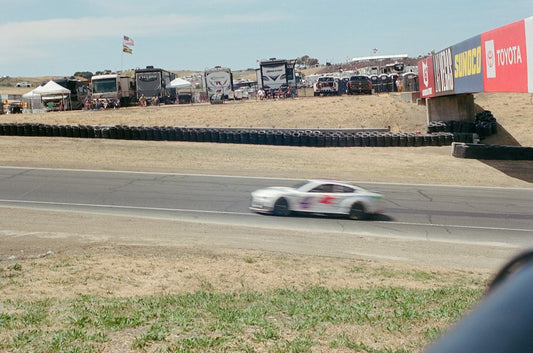The Mind Games of High-Speed Racing

High-speed racing is an exhilarating sport that captivates millions of fans around the world. The roar of the engines, the screeching of tires, and the adrenaline rush of watching drivers push the limits of speed and skill create a unique atmosphere that is both thrilling and captivating. However, behind the scenes, there is a hidden aspect of racing that is equally as important as the physical prowess of the drivers - the psychology of racing.
The psychology of racing
The psychology of racing refers to the mental processes and strategies that drivers employ to optimize their performance on the track. It encompasses various aspects such as focus, decision-making, mental preparation, overcoming fear, and resilience. Understanding the psychology of racing is crucial for drivers, as it can be the difference between victory and defeat.
Understanding drivers' mental processes
In the world of high-speed racing, where split-second decisions and lightning-fast reflexes are required, understanding the mental processes of drivers is of utmost importance. By understanding the psychology of racing, teams and drivers can gain a competitive edge by honing their mental skills and strategies.
Relevance in the world of motorsports
The relevance of psychology in the world of motorsports cannot be overstated. Racing is not just a physical battle, but also a mental one. The ability to maintain focus, make quick and effective decisions, and bounce back from setbacks is what separates the champions from the rest. By unraveling the mind games of high-speed racing, we can gain a deeper appreciation for the sport and the incredible mental fortitude of the drivers.
Focus: The Key to Success in Racing
Distractions and the need for laser-like focus
Maintaining focus in high-speed racing is crucial, as any distraction can have disastrous consequences. Whether it's the noise of the crowd, the pressure from competitors, or even the slightest lapse in concentration, distractions can lead to costly mistakes on the track. Drivers must develop a laser-like focus that allows them to block out external distractions and stay fully immersed in the race.
Techniques used by drivers to maintain concentration
To maintain concentration, drivers employ a variety of techniques. One common technique is visualization, where drivers mentally rehearse the race, visualizing every turn, every maneuver, and every potential obstacle. This helps them build familiarity with the track and mentally prepare for different scenarios. Another technique is the use of positive affirmations, where drivers repeat positive statements to themselves to boost confidence and maintain focus.
The role of adrenaline in focus
Adrenaline is an integral part of high-speed racing. It is the surge of adrenaline that fuels the drivers' focus and intensity during a race. However, too much adrenaline can also be detrimental, leading to heightened stress and decreased cognitive function. Finding the right balance of adrenaline is crucial for maintaining focus and optimal performance on the track.
Decision-Making Under Pressure
Split-second decisions in high-speed racing
High-speed racing is a sport that demands split-second decision-making. Drivers often have to make critical decisions in a matter of milliseconds, whether it's choosing the ideal racing line, deciding when to brake, or determining the best moment to overtake a competitor. The ability to make quick and effective decisions under pressure is a skill that sets top drivers apart.
Impact of pressure on decision-making
Pressure can have a significant impact on decision-making. The intense environment of high-speed racing, with its high stakes and fierce competition, can lead to heightened stress and anxiety. This can cloud a driver's judgment and impair their decision-making abilities. It is crucial for drivers to develop strategies to manage pressure and make clear-headed decisions.
Strategies used by drivers to make quick and effective decisions
Drivers employ various strategies to make quick and effective decisions under pressure. One such strategy is mental rehearsal, where drivers mentally prepare for different scenarios and practice making decisions in their minds. This helps them develop a repertoire of instinctive responses that they can rely on during races. Another strategy is mindfulness, where drivers cultivate a state of present-moment awareness, allowing them to stay calm and focused even in high-pressure situations.
Mental Preparation: The Mindset of a Champion
Mental preparation is a crucial aspect of racing that is often overlooked. Just as physical training is essential for building strength and endurance, mental preparation is essential for building confidence, focus, and resilience. Without proper mental preparation, even the most skilled drivers can falter under the pressure of high-speed racing.
Visualization exercises and positive affirmations are commonly used by drivers to mentally prepare for races. Visualization involves mentally rehearsing the race, visualizing every detail, and experiencing the sensations of speed and control. Positive affirmations, on the other hand, involve repeating positive statements to oneself to build confidence and reinforce a winning mindset.
Relaxation techniques play a vital role in building confidence and mental resilience. Techniques such as deep breathing, progressive muscle relaxation, and meditation help drivers calm their minds and bodies, reducing anxiety and stress. By incorporating these techniques into their pre-race routines, drivers can enter the track with a clear and focused mind.
Overcoming Fear and Managing Risk
The inherent risks of high-speed racing
High-speed racing is undoubtedly a dangerous sport. The inherent risks of racing at high speeds are ever-present, and drivers must confront their fears and manage risk on a regular basis. The ability to overcome fear and maintain composure in the face of danger is what separates the great drivers from the rest.
Managing fear and maintaining composure
Managing fear is a critical skill for drivers. Fear can be paralyzing and can hinder a driver's ability to make effective decisions and perform at their best. Drivers must learn to acknowledge their fears, understand the risks involved, and develop strategies to manage fear and maintain composure on the track.
Balancing risk and performance
Balancing risk and performance is a delicate tightrope that drivers must navigate. While taking calculated risks can lead to great rewards, excessive risk-taking can result in crashes and injuries. Top drivers understand the importance of finding the right balance between pushing the limits and staying within a safe margin. They assess the risks involved in every maneuver and make informed decisions that optimize their performance while minimizing the chances of accidents.
Mental Resilience: Bouncing Back from Setbacks
The demanding nature of racing and the need for mental resilience
Racing is a demanding sport that requires mental resilience. Setbacks, failures, and unexpected challenges are inevitable in high-speed racing. The ability to bounce back from setbacks, learn from failures, and maintain composure is a crucial skill that allows drivers to stay competitive and continue to improve.
Coping with unexpected challenges and failures
Coping with unexpected challenges and failures is a skill that top drivers possess. They understand that setbacks are part of the journey and see them as opportunities for growth and learning. Rather than dwelling on failures, they analyze what went wrong, make the necessary adjustments, and move forward with renewed determination.
Strategies for maintaining composure and focus
Maintaining composure and focus in the face of setbacks requires a combination of mental strategies. Drivers often rely on techniques such as positive self-talk, reframing challenges as opportunities, and setting realistic goals to stay motivated and focused. They also surround themselves with a strong support system that provides encouragement and helps them stay mentally resilient.
Studying the Psychology of Racing
Studying the psychology of racing presents unique challenges, one of which is gaining access to drivers for research purposes. Due to the demanding nature of the sport and the limited time available to drivers, conducting in-depth research and collecting data can be challenging. However, partnerships between research institutions and racing teams can provide valuable insights into the mental processes of drivers.
Ethical considerations also come into play when studying the psychology of racing. Researchers must ensure that the well-being and privacy of drivers are respected, and informed consent is obtained for any research conducted. Ethical guidelines and protocols must be followed to ensure that research is conducted in an ethical and responsible manner.
Overcoming potential biases is another challenge in studying the psychology of racing. Researchers must be aware of their own biases and strive to conduct research in an objective and unbiased manner. By employing rigorous research methods and seeking diverse perspectives, researchers can minimize biases and ensure the validity and reliability of their findings.
Conclusion
The psychology of racing is a fascinating and essential aspect of high-speed racing. Understanding the mental processes and strategies employed by drivers can provide valuable insights into their performance and help teams gain a competitive edge.
From maintaining focus and making quick decisions under pressure to mental preparation and overcoming fear, the mind games of high-speed racing are as thrilling as the sport itself.
Ongoing research and developments in the field of sports psychology continue to shed light on the intricacies of the psychology of racing, further enhancing our understanding of this exciting sport.






